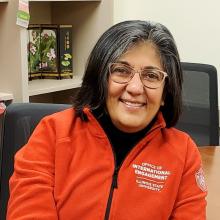Resilience at the Crossroads of Career and Identity

As I reflect on my quarter century in international education and life in the United States, I find myself humble and proud of two defining occurrences: The pivot from high school teacher to international educator and the gradual emergence of the diversity practitioner.
From Teacher to Student to International Educator
When I came to the United States as an international student, I was pursuing a master’s degree and teaching credential so that I could continue teaching in Mumbai, India. I had absolutely loved my 12-year career teaching English and social studies, and I couldn’t think of doing anything else. I was also at a crossroads in my life, and I was a nontraditional student: experienced in my field, divorced, older than other international students, etc.
I was also incredibly fortunate to be hired by the international office on campus when I shared a bit about myself at orientation. So, in addition to being a student, I was also coordinating impactful programs to empower international students and using my teaching experiences to connect, advocate effectively, and provide learning opportunities outside the classroom.
As I progressed through my coursework and went into the schools to do my student teaching, I encountered one of my greatest culture shock moments: the lack of respect for teachers. I came from a culture that revered teachers, and having a master teacher call me a “rookie” and a parent back me into a corner and poke me in the shoulder were just horrifying to me.
I believe that, as international educators, we were doing the work of diversity and inclusion long before it was formally recognized by higher education.
By the time I completed my degree and credential, I knew that I had found a new career that mattered more to me than teaching. More importantly, I knew I was making a difference to international students. I chose to grow in international education; one of my fondest memories from early in my career is participating in an F-1 training workshop at a Region XII Conference. In hindsight, I think I was an obnoxious know-it-all, but the trainers graciously awarded me a “Best Participant” certificate!
Stepping Fully onto a New Path
As I grew and evolved from teacher to administrator, I was also learning about the diverse needs of college students. I was a graduate student employee on September 11, 2001. I remember reaching out to my fellow students, creating spaces to process what was happening, and serving as a resource to some who were experiencing hate. In that moment, I wasn’t Indian: I was international, and it was my duty and opportunity to help however I could. I had the institutional knowledge and ability to offer appropriate resources. I also had to work on the cultural concepts that were “hardwired” into my brain and retrain myself to refrain from making assumptions, to ask questions, and to respect what I was hearing from my fellow students and colleagues.
I believe that, as international educators, we were doing the work of diversity and inclusion long before it was formally recognized by higher education. The work of creating a sense of belonging and supporting students who are eligible for limited benefits is a heavy lift, and we do this all day, every day.
Learning Along the Way
I continue to work on my “Indianness” every day as well. I was never the stereotypical chai-drinking, Bollywood-dancing person to begin with, but I changed as I grew in my new field and, eventually, my new country. I was also growing in my leadership journey and loved the opportunity to learn from seasoned leaders at NAFSA’s Management Development Program.
Additionally, I grew to actively apply the concepts of power and privilege to my daily interactions. As a director, I thought I was making helpful decisions to support a subordinate who was experiencing some personal challenges. I was taken aback when I was accused of micromanaging and disempowering them. In another situation, I offered some well-meaning advice to a colleague, and they responded by calling me “Mom.” It was not intended to be kind, and I realized that whether I’m being my usual Indian or proactive self, it doesn’t necessarily land on people as I may intend.
I have no regrets about this incredible journey and the privilege of service that continues to bring me new opportunities.
I have also learned to soften my words: I like to say, “The greater my title, the louder are my words.” I try to be cognizant of my intent and potential impact when I communicate. Whether I am interacting with students or colleagues, my brain is recalibrating my identity to adapt to the individual and situation. Am I a foreign-born educator? American? Desi (from the Indian subcontinent)? Cis woman? Manager-supervisor? Subordinate? Leader? One of them? All of them? It is never the same.
So, am I perfect and have I figured it all out? Far from it! I end every workday thinking about what and how I could have done better, and I wake up every morning pledging to be kind and thoughtful—and to dial back my “Indianness!” I have also learned that, as leaders, we need to own our humanity and create spaces and opportunities for colleagues to treat us with the same kindness and respect that they expect. I am exhilarated and exhausted every day, but I continue to be strong, humble, and positive. I have no regrets about this incredible journey and the privilege of service that continues to bring me new opportunities. •
Roopa Rawjee is the executive director of the Office of International Engagement at Illinois State University and member-at-large and inaugural mentor for NAFSA RISE fellows.
About International Educator
International Educator is NAFSA’s flagship publication and has been published continually since 1990. As a record of the association and the field of international education, IE includes articles on a variety of topics, trends, and issues facing NAFSA members and their work.
From in-depth features to interviews with thought leaders and columns tailored to NAFSA’s knowledge communities, IE provides must-read context and analysis to those working around the globe to advance international education and exchange.
About NAFSA
NAFSA: Association of International Educators is the world's largest nonprofit association dedicated to international education and exchange. NAFSA serves the needs of more than 10,000 members and international educators worldwide at more than 3,500 institutions, in over 150 countries.
NAFSA membership provides you with unmatched access to best-in-class programs, critical updates, and resources to professionalize your practice. Members gain unrivaled opportunities to partner with experienced international education leaders.















